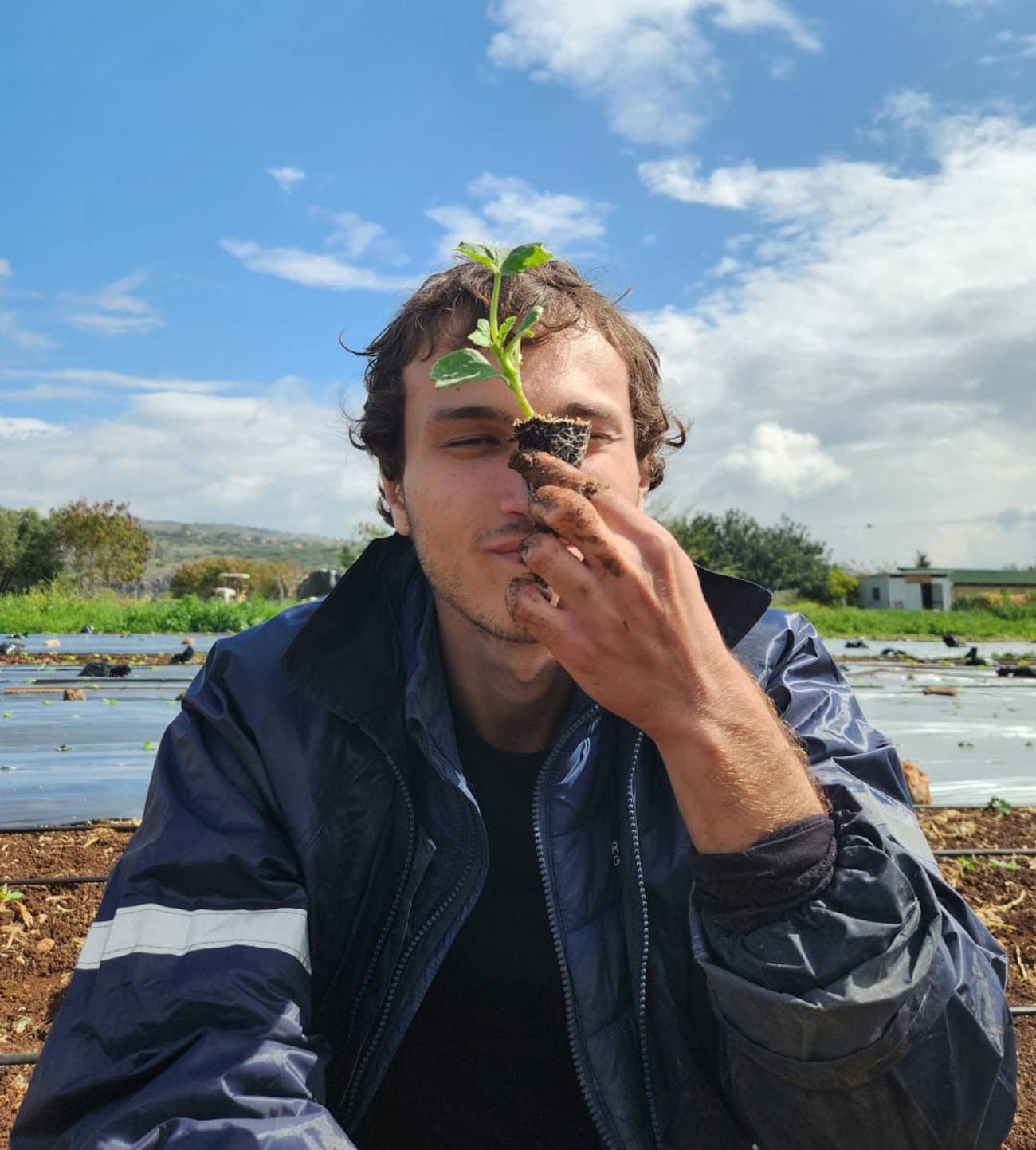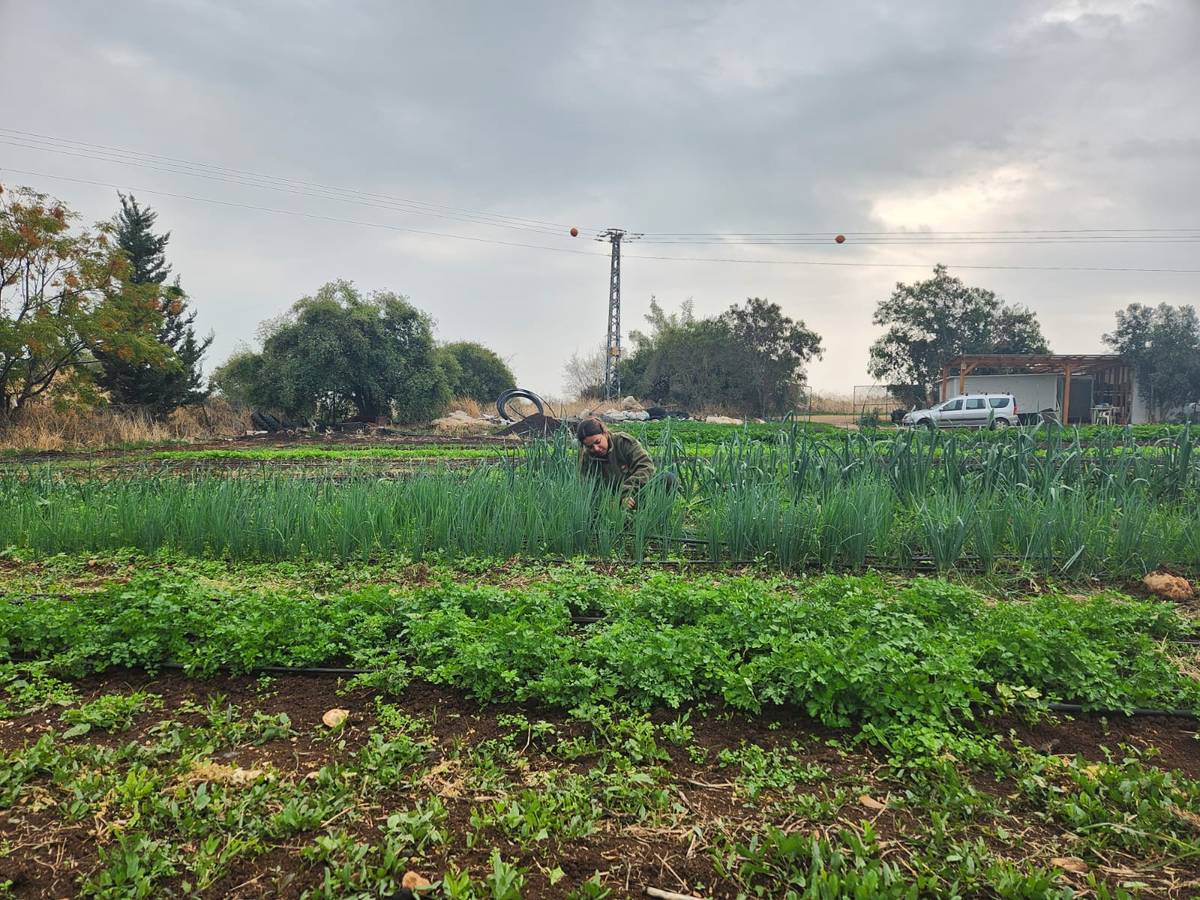A Place to Nurture Plants—and People
June 12, 2023 – Ani Wilcenski, Tablet
At an organic farm in northern Israel, troubled teenagers find a refuge where they can change the course of their lives

A few months ago, on a family trip to Israel, we drove deep into the green hills of the Galilee Valley to visit a sustainable farm called Kaima Hukuk. The reason for our trip was educational; my younger brother is studying sustainable agriculture at Cornell, where he spends his school days climbing trees and growing corn (I imagine) and was excited to learn about Israel’s world famous agricultural innovations. As a New Yorker who can barely keep a potted plant alive, I tagged along with mild annoyance, preparing to tune out as we walked through fields of carrots and talked about watering cans, or whatever farming people do.
But 10 minutes into the visit, I was utterly engrossed. For one, the farm, which is located on a picturesque kibbutz, was beautiful, with lush green fields set against puffy white clouds and a soundtrack of chirping birds. Standing in the field and looking up into the distance, you can see the stone buildings of Tzfat, Israel’s mystical city, stacked against the sky.
The symbolism is a little too perfect. As the 45-year-old farm manager, Asaf Zaiden, explained as he walked us through the fields, Kaima Hukuk, named after the kibbutz, is mostly operated by people from Tzfat and the surrounding areas—specifically teenagers, some as young as 12, who have dropped out of school and came to Kaima Hukuk with nowhere else to go.
It is estimated that 11% of Israeli children have dropped out of school, a number that rose dramatically during the pandemic. The government is working to combat the trend, but the official numbers don’t tell the full story. According to the Education Ministry, the total number of formal dropouts during the 2020-21 school year averaged only half a percent of the student population. But there is a much larger group of unofficial, or “hidden,” dropouts—children who struggle with significant social, personal, and emotional challenges that make them “present but absent” in the Israeli school system.
Kaima Hukuk’s mission, using a model of “employment as education,” is to help these dropouts turn their lives around. Zaiden, who used to work as a teacher for disabled adults, helped found the project in 2015. The organizers modeled the farm after Kaima Beit Zayit, an organic farm on the outskirts of Jerusalem that had developed a hybrid pedagogic-vocational style of mentoring struggling youth. “When I came to the area, I saw there were a lot of children who needed an answer,” said Zaiden.
The children who come to the farm feel that the system has failed them. Many are victims of abuse; some are on the streets struggling with drugs and alcohol and committing petty crimes. Others are suffering from anxiety, depression, and other untreated mental health issues. Nearly everyone is from a poor, religious or very religious family with lots of children, where a child’s challenges can easily fade into the background of a crowded home. Some are questioning whether they even believe in God anymore, a struggle complicated by their devout families and the growing conservatism of Tzfat and the surrounding areas.
The farm workers are now evenly split between girls and boys, but in the past the farm was nearly 75% girls. Sometimes sisters would come from the same family. “It is a cruel world outside,” explained Zaiden. “They know the farm will be a safe place for them. They will be respected as human beings here.”

“We want everybody to come to the field and feel that it is a refuge,” added Rebecca Schunkert, the farm’s 42-year-old CEO. “It is different from the world outside. Here, you can rest. You can be the child that you are, because sometimes outside you are forced to act like an adult already.”
Beyond the six adult employees, including Zaiden and Schunkert, there are two subgroups working on the farm. One group consists of 15 children, ranging from ages 12 to 18, who have left school. These children all still live at home, but most work at the farm five days a week from 7 a.m. to 2:30 p.m. Everyone (except the 12-year-old, who is volunteering because he is too young to be legally paid) makes 21 shekels—just under $6—per hour and is given breakfast and lunch, which, for many, is important. They are also given evening support if they want academic assistance, or the opportunity to meet with a therapist. The other group is slightly older, consisting of nine volunteers between 18 and 21 doing two years of national service instead of joining the army. They live at the kibbutz full time, along with the adults, and volunteer daily alongside the youth. The farm’s only relationship to the kibbutz is the land-sharing partnership; beyond that, it is self-sustaining.
Kaima Hukuk grows a wide and seasonal variety of vegetables, from sweet potatoes and tomatoes to lettuce and the greenest kale I’ve seen in my entire life. However, the workers know almost nothing about farming when they arrive. Everyone needs to be taught in full. (“We have a lot of patience,” Zaiden said diplomatically with a laugh when I asked about the ease of this process.) Accordingly, the farm isn’t exactly a model of high-speed efficiency, but that isn’t the point. Take weeding:
“If there is a good connection between a young girl and a national service volunteer, let’s say, I send them to weed one of the beds,” said Zaiden. “I know this work would take a professional farmer 20 minutes, but for these two it could take an hour and a half. I don’t mind if they sit on the soil weeding and talking—I want them to have good conversations.”
Every child has a different journey (a word Schunkert and Zaiden kept using) to and from Kaima Hukuk. Nobody is assigned to work on the farm; educational offices in local cities will send potential workers, and the farm’s adults do outreach in the community, talking to struggling youth about the program and whether they’re interested, but ultimately the decision belongs to the child. This is also true with the length of their stay; children who are becoming valuable workers often choose to stay at the farm, moving through different divisions. Others choose to leave after a few months and go back to school.
The duration of their stay matters far less than the impact it makes on the cycles of crime, abuse, or isolation they’ve found themselves stuck in. “At the end of the day, the core mission of the farm is about building relationships with others, about helping them regain their trust in society,” said Zaiden.
Kaima Hukuk operates on the understanding that the principles of organic farming—variety, patience, cultivation, and especially trust in natural processes—work the same way for plants and for people. They’ve found a lot of success with this idea.
Zaiden spoke about a boy who came to the farm at age 15, struggling with severe social anxiety. He’d spent the previous year at home playing video games, speaking to nobody, and almost never leaving the house. Gradually, he grew to enjoy the work and began coming to the farm more and more. Now, at 17, he works four days a week, happily socializes, and is much more open to the world. “When he started, he was sickly and pale,” said Zaiden. “Now he looks healthy and strong—he looks alive.”

“For me, working here is like being on a cruise,” said another child. “Just like on a cruise, at Kaima, you get to enjoy the journey.” Plus, he added, “there are six adults here with their heads screwed on their shoulders, nice people with good people skills who I love.”
Kaima Hukuk operates on the understanding that the principles of organic farming—variety, patience, cultivation, and especially trust in natural processes—work the same way for plants and for people. They’ve found a lot of success with this idea.
Zaiden shared another story about two girls from big religious families in Tzfat: Both were 16 and had already been dropouts for three years, instead spending their days smoking weed and going to parties. They took to life at Kaima Hukuk, waking up early, coming every day, and working hard. Both said that this was the first place they’d ever felt truly committed to. After four months, one of them decided to go back to school in the evenings. Soon, she got even more serious about her studies and enrolled full time. The other girl saw this and went back to school herself shortly after. Both went on to pass their final exams and graduate—with good grades, too.
“Nobody imagined that these girls would ever finish school,” said Zaiden. “And now one of them is doing national service, in Tzfat, with troubled youth, at an alternative café she visited herself as a young girl.”
Fueled by its successes, Kaima Hukuk is hoping to take in even more vulnerable youth. The Kaima network has grown to four; it now includes a farm exclusively for struggling girls and a farm in Tanzania. To stay afloat, Hukuk has a funding partnership with Beit Zayit, the original Kaima farm outside of Jerusalem, as well as a few Israeli organizations that support agriculture. Following the Community Supported Agriculture model, they sell 80% of their vegetables through baskets delivered weekly to residents of the area, making up half of their revenue, and sell to other farms the remaining 20% that they don’t donate or eat.
They’re trying to get into a program through Israel’s welfare office that would give them a parcel of money for each incoming worker, though with the chaos after the last election, that hasn’t happened yet. Schunkert has a lot of dreams for Kaima Hukuk’s future—not just being able to employ more people, but also building a visitors center where groups like my family can come have a farm-to-table meal; hiring a new social worker (theirs just left); getting a new vehicle to drive workers and sell vegetables; and updating their irrigation system. Also, they hope to replace their tractor, which is from 1972.
But for now, they’re “still struggling,” said Schunkert. The organization relies on donations (which need to be earmarked specifically for Kaima Hukuk on the donation page), but “it’s a difficult time in the world. People’s budgets are tight.” They’ve seen time and time again that Kaima Hukuk can be the answer these children are seeking.
“We know we can change the course of children’s lives,” said Zaiden. “Now, we want to have the resources so we can help even more.”






